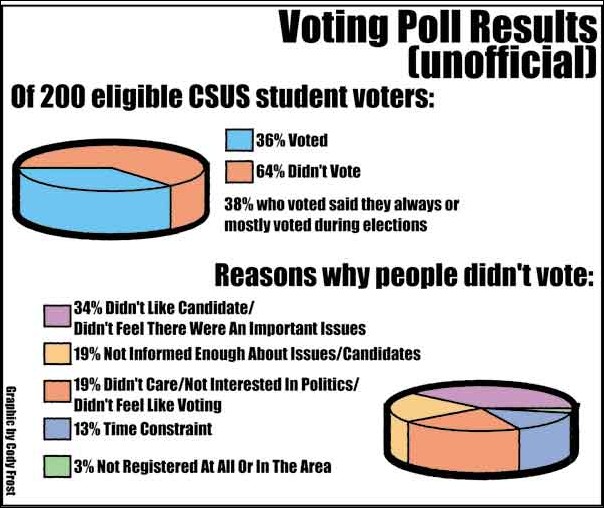Unofficial survey suggests students don’t cast vote
November 13, 2002
Election slogans across America stating, “If you don’t vote, you don’t count,” weren’t enough to get most students to the voting booths for last Tuesday’s election.
Robert Curva, 22, a senior mechanical engineering student at Sacramento State, did not vote. Though he voted in the 2000 presidential election, he mostly stays away from politics.
“I feel my vote doesn’t make a difference,” he said.
Curva said he has other things more important than government to care about, like class tests.
“Who’s going to be governor is the last thing on my mind,” Curva said. “Plus, I don’t get paid enough, so I don’t have to worry about where my taxes are going.”
Distance from his voting precinct also dampened any motivation to vote.
“My voting place is down in Vallejo. I don’t feel like driving there from Sacramento,” Curva said.
Curva’s reasons for not voting are common among students.
In an unofficial State Hornet Poll of 200 Sac State students eligible to vote, 64 percent didn’t vote this election. Not registering in the area or at all was the main reason listed, followed by time conflicts with work or school, or just not caring about politics.
Thirty-four percent of students polled had never voted, before.
The registration level of college students is roughly 52 percent, 16 percentage points below that of the total voting age population, according to the Institute for Public Affairs and Civic Engagement.
Despite the efforts of MTV’s “Rock the Vote” campaign and indoctrination of democracy’s ideals in high school and college general education government classes, voter turnout among 18-24 year-olds declined to 32 percent in 2000 from 50 percent in 1971, when 18-21 year-olds first exercised their rights as citizens.
This is why students have very little potential to influence the political arena, said John Victor, a lecturer for Government 1.
“If (students) don’t vote, politicians don’t pay attention to them,” Victor said.
Some students don’t want to pay attention to politicians, either.
“I didn’t like either of my choices for governor,” said John Turlich, a junior Kinesiology major. “As important as politics is, I try to stay away from it because the candidates seem to forget about the people when they get elected.”
Campaign propaganda and mudslinging also make it hard for students to figure out for whom they should vote.
“It’s really hard to judge a candidate and make sure they are who they say they are and do what they say they’re going to do,” said Heather Halleday, 21, a senior Human Resources major.
Other responsibilities in students’ lives often shadow voting opportunities.
Lisa Tabin, senior sociology major, had a study group for a quiz, the next day, and a paper due.
“I had to do first things first,” Tabin said. “I had to go to work and then school right after, and I didn’t make it to the polls on time,” she said.
The reason more students do not vote is because the whole voting process is so cumbersome, said Eric Guerra, president of Associated Students, Inc.
“Students live such a busy lifestyle,” Guerra said.
Guerra looked into setting up voting booths on campus as a solution to students’ busy schedules on Election Day.
“Some of the problems with that are parking and accessibility,” ASI press secretary, Erin Hicks said.
Hicks also said students should know that the absentee ballot is an option for students out of their precinct, or those who can’t vote on election day.
“A lot of people don’t know that the option is there, and that it’s so easy,” Hicks said.
The only way to really get students out there to vote is to give them a reason to want change, said Jon Rotondo, a freshman who ran this past election for a seat on Galt City Council.
“You can’t just get people to vote, Rotondo said. “They have to want to participate.”
Students could be more motivated to participate in the political arena if politicians addressed issues that directly affect them, Curva said.
“They (politicians) need to invest more in education, in the youth,” said Curva. “Also, if they give more money to school, that means more places to park.”

























































































































